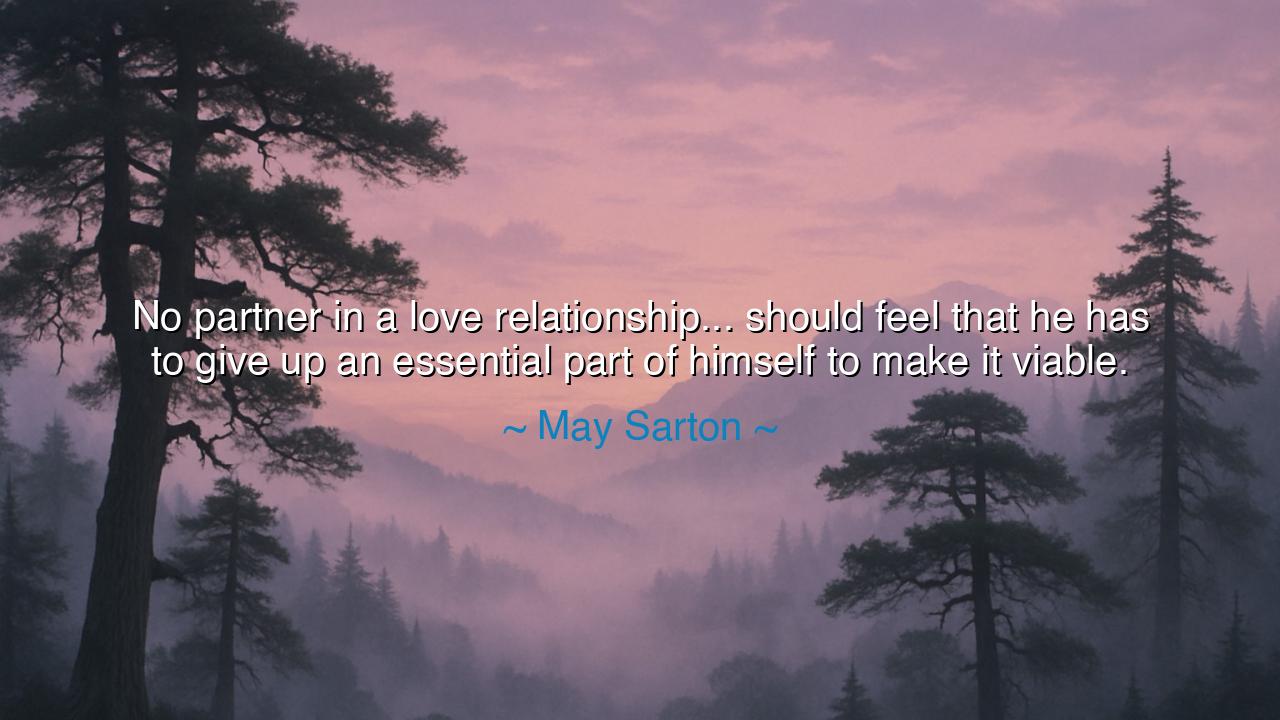
No partner in a love relationship... should feel that he has to
No partner in a love relationship... should feel that he has to give up an essential part of himself to make it viable.






Hearken, children of the ages, to the words of May Sarton, the sage of the human heart: "No partner in a love relationship should feel that he has to give up an essential part of himself to make it viable." Here lies a teaching of integrity, self-respect, and the sacred balance of intimacy. Love, she reminds us, is not a forge of sacrifice that burns the self to embers; it is a sanctuary in which each spirit may flourish while entwined with another.
Know that in these words there is both caution and empowerment. To surrender an essential part of oneself is to diminish the soul, even for the sake of love. May Sarton teaches that a love relationship thrives not through self-erasure, but through mutual respect, understanding, and the embrace of individuality. The ancients would counsel that true companionship honors the wholeness of each partner, for to lose oneself is to lose the very essence that drew the other near.
Yet, consider also the delicate harmony of connection. A partner must give freely of love, attention, and devotion, yet never at the cost of their inner truth. Sarton’s insight reveals that love that demands surrender of the self is a fragile construct, built on compromise too great to endure. The heart that remains whole enriches the union, while the heart that is diminished carries only shadows into the bond.
And behold, there is heroism in self-respect. To maintain one’s essential parts within a love relationship is to act with courage, honesty, and wisdom. It is the bravery to insist upon authenticity, to weave intimacy without sacrifice of identity, and to honor both the self and the beloved. In this balance, love becomes a source of growth, nourishment, and enduring strength.
Thus, remember, future generations: love is not a cage, nor a trial of self-abnegation. A love relationship flourishes when each partner is free to bring their entire being, their joys, fears, and truths, without surrendering that which is essential. The preservation of self is not selfishness, but the foundation of lasting intimacy.
In the end, the ancients would say: cherish love, yet guard the soul. For the heart that gives freely yet remains whole is a light that sustains the union. No essential part should be abandoned, for the strength of the bond is measured not by sacrifice, but by the authenticity, respect, and wholeness that each partner brings to the sacred dance of shared life.






NQbao nguyen quoc
This quote resonates with me, especially when thinking about relationships that become stifling over time. When one person feels the need to suppress their true self, is the relationship still worth pursuing? At what point does love turn into a situation where we feel like we’re compromising our essence? Is it really possible to preserve both love and identity in a deep, lasting relationship?
NANguyen Thi Ngoc Anh
Sarton’s perspective offers a valuable point about the importance of self-preservation in relationships. But how do we navigate the pressure of societal expectations that suggest love means sacrifice? Is there a difference between giving up something trivial for the sake of the relationship and losing something vital? How do we keep a balance between love and individuality while avoiding the feeling that we are ‘giving up’ who we are?
TBNguyen Trong Binh
I appreciate this quote because it speaks to the need for autonomy within relationships. Yet, is it always practical to expect two people to stay true to themselves without making any compromises? Relationships are a blend of give-and-take, so where do we draw the line? Can a relationship still be viable if there’s no space for change or growth in either person’s identity?
TNLe Thi Thao Nguyen
May Sarton’s words are a reminder that love should enhance, not diminish, who we are. But is it possible to truly have this balance in a world where relationships often require compromise? When two people come together, how do they maintain their individuality without it becoming a source of tension? Can love really thrive without the risk of losing parts of ourselves, or is some sacrifice inevitable in the name of intimacy?
YNPhi yen Nguyen
This quote really resonates with me. In a healthy relationship, both partners should feel they can fully express themselves without fear of losing who they are. But how realistic is it to have a relationship where both individuals remain completely independent? Is there a line between compromise and self-sacrifice, and how do we know when we’ve crossed it? How do we preserve our personal identities while nurturing love?